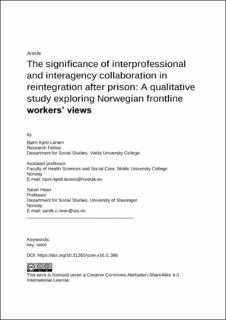| dc.description.abstract | The Norwegian Correctional Service is well known for its focus on rehabilitation and the humane treatment of offenders. However, welfare issues and comorbidity are overrepresented among offenders, and recidivism ratesremain unacceptably high. Mental health problems, substance abuse and a lack of housing suggest that offenders need support from a range of services in their reintegration processes. This calls for collaboration between frontline workers, welfare agenciesand non-governmental organizations, especially in the transition from prison back into society.In the present study, we aim to explore frontline workers’ views of interprofessional and interagency collaboration among frontline workers working with offenders suffering from substance abuse issues in their reintegration after prison.Semi-structured interviews were conducted with nine frontline workers employed in welfare agencies and the correctional service, with workers directly engaged in supporting offenders ́ reintegration after prison.Findings suggest that interprofessional collaboration is perceived as multifaceted. The participants in the study perceived the welfare needs of offenders as complex, and the transition phase from prison as particularly vulnerable. Finally, findings suggest that frontline workers’ individual values and engagement in the work, as well as a lack of shared knowledge and shared information among frontline workers, are perceived as important factors in how collaboration processes unfold.We further argue that there is a need for additional knowledge, such as theoretical frameworks and conceptual models, to increase the understanding of interprofessional collaboration in the interface between prison and welfare services. We discuss substance abusers’ transition from prison into society and interprofessional collaboration in this context, using relational coordination as a theoretical framework.This study shows that relational coordination contributes to a greater understanding of interprofessional collaboration in the prison-welfare context, but an understanding of this phenomenon may be further developed by expanding the theory of relational Journal of Comparative Social Work 2021/1111collaboration, and by using other relevant theories and models. New insights are presented and illustrated, combining the theoretical and practical aspects of interprofessional collaboration. Keywords:interprofessional collaboration, relational coordination, offenders, substance abuse, reintegration, frontline workers | |
